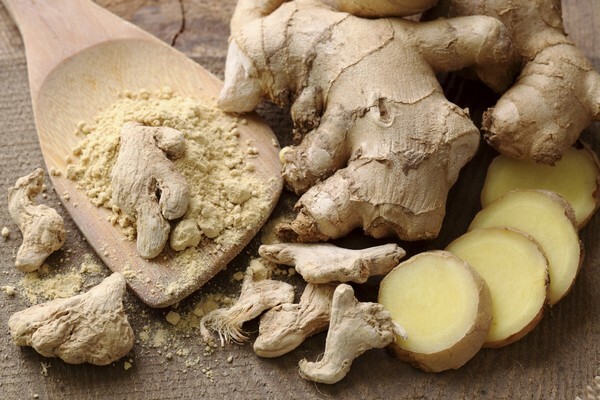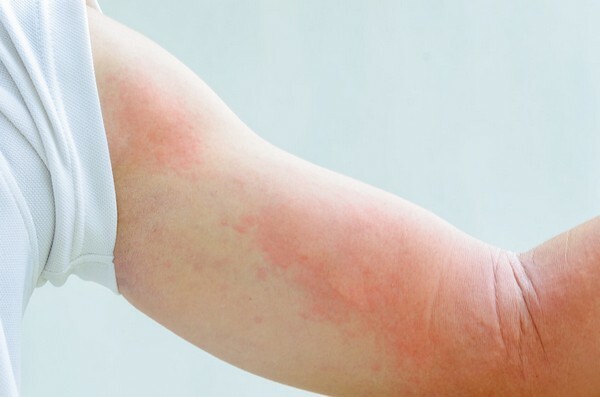- Causes of
- Symptoms of
Ginger contains essential oils that give its roots a sharp taste and aroma, in which it is possible to distinguish thin lemon notes. Spicy plant is widely used in cooking for soups, side dishes, vegetable salads. The ground root is added to the dough for baking gingerbread, pies, buns. Traditional healers with the help of ginger treat diseases of the cardiovascular and urinary system. A hot fragrant tea quickly strengthens the immunity of adults and toddlers. All these delicious foods and effective treatments become inaccessible to humans if they are diagnosed as allergic to ginger. Recently, there have been methods of therapy that allow you to get rid of pathology forever.

Causes of
Most allergic reactions occur in people throughout life. This is especially true with regard to food intolerance, because new foodstuffs appear daily on the shelves of stores. Many of them contain powder from the crushed roots of ginger or its essential oil. Buying a biscuit or a biscuit roll, a person rarely pays attention to the composition of flavors or taste improvers. And only after the appearance of a perspiration in the throat and redness on the skin understands that he develops an allergic reaction to one of the ingredients of delicious baking.
Warning: If an adult or a child has an individual intolerance to wormwood or mustard, then with a high degree of probability he will be diagnosed with an allergy after eating ginger. The fact is that plants contain a similar combination of essential oils.
The susceptibility to the development of the sensitization reaction to the biologically active substances of ginger can arise for several reasons:
- congenital intolerance is not amenable to treatment, since the immune system initially reacts incorrectly to the plant. She takes ginger for a protein that is foreign to the body and begins to work hard to produce antibodies for protection. The result of such an immune response is urticaria and nasal congestion;
- individual sensitivity is formed over time, usually after 40-45 years. Provoke the emergence of allergies can chronic diseases, neurological disorders, reducing the body's defenses;
- often reddening and rashes on the skin occur when using a large number of spicy roots. If a couple of eaten pickled slices of ginger does not provoke any negative symptoms, then the third can cause a violent allergic reaction. Allergists attribute this to the deficiency of specific enzymes produced by the pancreas.
There is also a "false" allergy to ginger. Spicy roots are used to make bun and puff pastry. If, after its use, a person develops an allergic reaction, then its "culprit" is appointed ginger, although the body so reacted to vanilla or cinnamon.

Symptoms of
Traditional medicine specialists do not doubt whether ginger can cause allergies. It is diagnosed quite often, sometimes occurs in forms dangerous to human life - in the form of Quincke's edema or anaphylactic shock. In these cases, the allergic reaction proceeds rapidly and in a short time. After 20-30 minutes a person has problems with breathing, blood pressure drops, heart rate slows down. If not quickly provided with qualified medical care, then the likelihood of a lethal outcome is high. Fortunately, anaphylactic shock and Quincke's edema appear after the intake of ginger very rarely. The usual symptoms of an allergy to a spicy plant are much less pronounced.
Recommendation: Do not include ginger in your diet for pregnant and breastfeeding women. If the mother does not have allergies to the essential oils of the plant, then there is no guarantee that it is absent in the child. "
Skin Symptoms
An allergic reaction may develop after consuming fresh ginger or powder from its dried roots. After a few minutes or hours, large blisters or small pimples form on the upper layer of the epidermis, and the skin around them quickly turns red. In the severe course of the sensitization reaction, large edema develops, spreading over large parts of the extremities or the upper half of the trunk. In children, the allergy is primarily visualized on the cheeks.
The most painful clinical manifestation is intolerable skin itching. When combing, the dermis is often injured. On the cracks and wounds formed, staphylococci and streptococci rapidly penetrate, provoking the development of a bacterial infection.

Respiratory symptoms
Immediately after ingestion of ginger on the mucous membrane of the mouth, respiratory clinical manifestations occur. For allergies, there is abundant lacrimation, a sore throat, from which a person tries to get rid by frequent cough. From the nasal passages, liquid mucus is released as a result of its increased production of glands. All respiratory symptoms of allergy to ginger are protective reactions of the body for the rapid removal of allergic agents from the respiratory tract. What is still characteristic of the pathological condition:
- frequent sneezing;
- nasal congestion due to edema;
- dry, clammy cough.
Dyspeptic symptoms
After 30-40 minutes after eating ginger, indigestion and peristalsis occur. In the gastrointestinal tract, excess gas production begins, characterized by the following symptoms:
- nausea;
- attacks of vomiting;
- diarrhea;
- pain in the epigastric region;
- bubbling and rumbling in the abdomen.
Similar symptoms occur in food poisoning and intestinal infections, so patients are given differential diagnosis to establish the true cause of dyspeptic disorders.
Treatment of
If a patient has been diagnosed with a life-long allergy to ginger, he will be offered immunotherapy. This method of treatment consists in the introduction of small doses of an allergen to "accustom" the body to their effects. Before therapy, all allergens to which the patient is sensitive are established during laboratory tests.
Tip: If you develop a violent allergic reaction, immediately call an ambulance. A small child should be delivered to the hospital as soon as possible, even if there is no significant symptomatology.
Quickly eliminate the clinical manifestations of allergy antihistamines in solution or tablets. The most effective are Loratadin, Zodak, Zirtek, Tavegil, Suprastin, Tsetrin, Clarotadine. It is usually enough to take one tablet or 3-5 drops of solution so that the allergy disappears without a trace.
